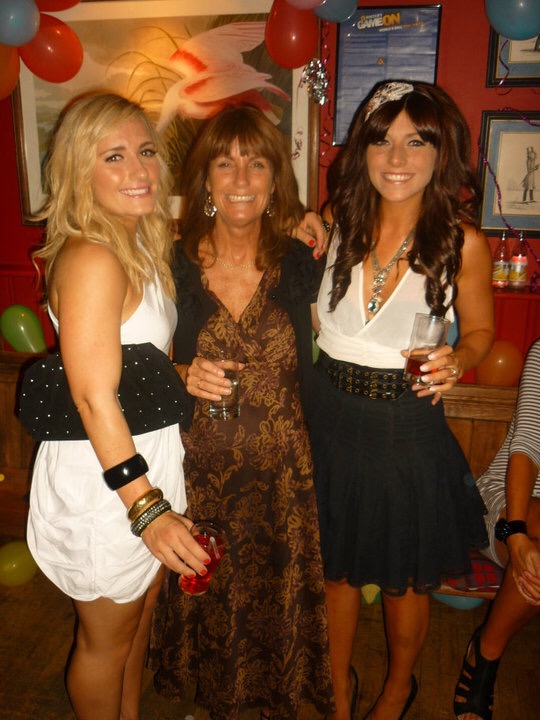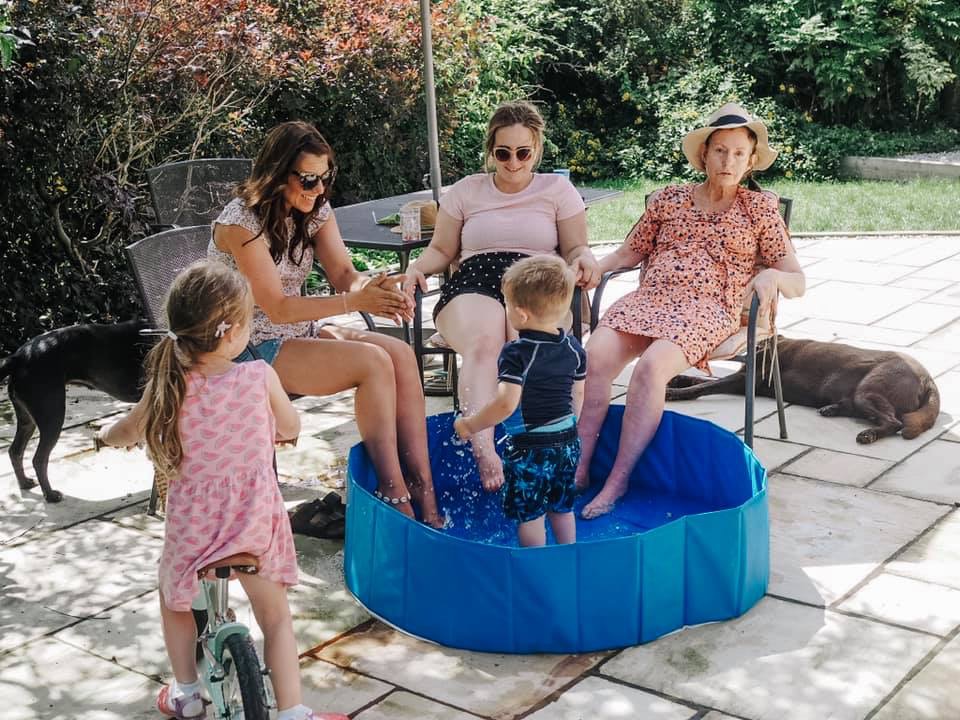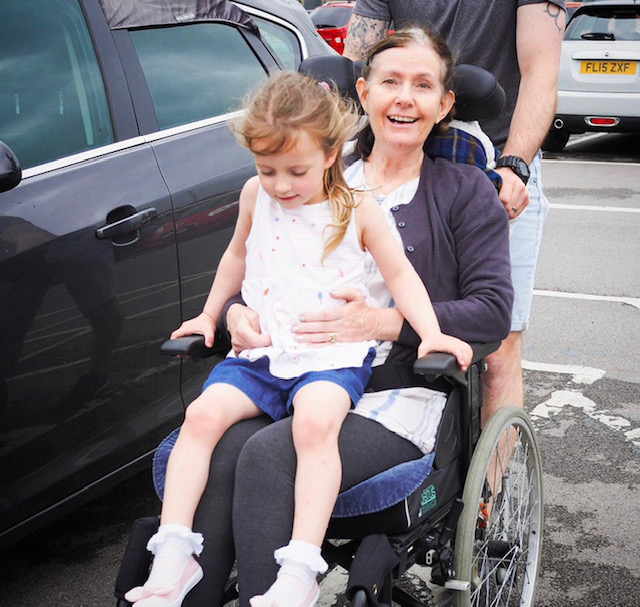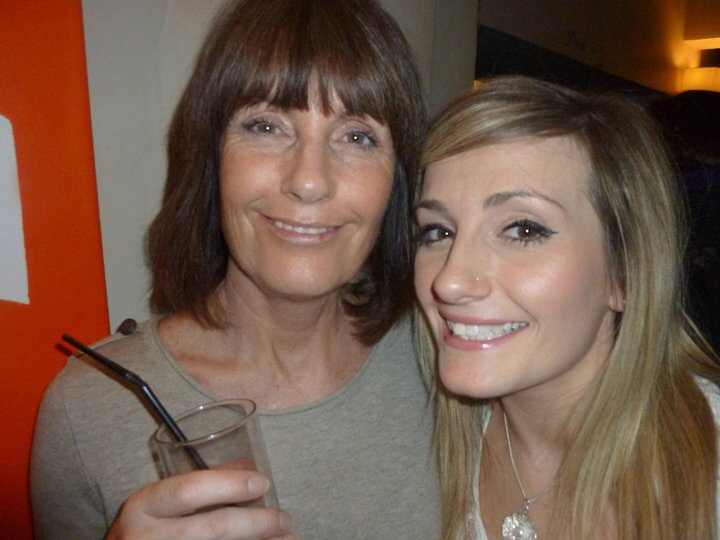One day I’m sneaking out of my friend's with her to meet boys and drink WKD (Yes I really was quite a rebellious teen, and yes this was you Gina)... the next day I’m dealing with the devastating news that my Mum has an incurable, degenerative condition called Huntington’s Disease. A disease that could also be my Sister’s or my fate. And it’s back to school tomorrow, and for my science lesson on genetics, where inevitably they discuss the passing of Huntington’s Disease. Is that called ‘sod’s law’?

I turn 30 in November this year, and I feel like I'm getting a PHD from the University of Life. I'm stuck on a really shit rollercoaster, in a theme park I didn't want to go to, and can't escape. The weather keeps changing, one minute the rollercoaster stops and the sun is out, the next minute I'm hurled upside down and the rain is smashing down on me and hail is smacking me in the head every time I put my head up. That's the unpredictability of HD.

It’s fair to say I have always felt a protective instinct towards my Mum. Call it intuition, or being an empath, or perhaps my parents couldn’t hide it as well as they thought, but I always saw she was vulnerable. But never did I think I would be doing the role I am doing today.

The minute we knew about HD it changed my relationship with Mum forever. I missed out, and still do miss out, on a lot of things that a normal teenager or young woman would have from their Mum. For what it is worth, before HD wrapped its tail around her, she was the best Mum in the world. Funny, kind, generous, and warm. She loved nothing more than spending time with me and Kelly.

I can’t imagine how she felt when they broke the news, as I know she wanted to support us and for us to talk about it, but I wanted her to believe I was dealing with it OK (which I definitely was not). So, I shut her out, told her I was fine, and went through the normal teenager turmoil but kept a lot from her. I developed major issues of my own, but was too confused and stubborn to let her in. I didn’t like anyone seeing me vulnerable.

If I had a rewind button, I would talk to her so much. I would cry, let her hug me and let her be my Mum. I took that away from her when she was still well, and I really feel like I wasted precious time where I could have got to know her better as a teenager becoming an adult. Unfortunately her symptoms began to change the Mum we knew fairly soon after, and my role as a daughter changed over a matter of weeks to carer. Even at 15/16 I recall sitting with her after a psychotic outburst and reassuring her it would be OK.

Don’t get me wrong, we have always been close, and made some great memories once I grew out of the rebellious age at about 18, but it was up and down adapting to the bad days. It is a very unpredictable disease even in the early stages. After we had the news there was probably a good three years of me rebelling, being out until 3am, not talking, and all that time she wanted to talk to me.
Even at 18 when I matured a lot, I still protected her and didn't let her in, I couldn't make her pain any worse by letting her know what I was going through. The reality is, she was the most selfless woman and would have only wanted to help.

When the mood swings started, there were constant unpredictable and instant mood changes which would see my Mum swearing at me or Kel, which was completely out of character. Perhaps even a pan launched across the kitchen at our heads too (my sister will chuckle at this, as one time, she scooped a mouthful of delicious pasta pesto into her mouth as we watched a pan fly across and swipe her bowl away straight into the wall… we were so shocked we actually laughed, a weird but wonderful coping mechanism we have always had).

Tonight, my Saturday night off shift work, I lay with Mum in her bed holding her hand, until she stopped crying and pleading with me asking ‘what time is tea’. She has probably said this in the region of 70 times since this afternoon alone and it’s 11pm. She has had more food than a herd of rhinos. She has spent the day severely distressed, with no normal tactics helping and no medication calming her down. It has been very distressing to see her like this and not be able to help.

Things are declining rather quickly now, and communication can be limited to nothing at times with this phrase often being what comes out. I lie here and wonder how the hell we will cope if we have another week like this now, or what we will do if it worsens again? I lie here and contemplate on how much my life has changed, and my parent’s life, and I grieve for the life it could have been. I lie here and hold Mum’s hand so tight, and pray that she will tire herself out soon and go to sleep, so I know she is comfortable. This disease makes people suffer so so much.

Being a carer is so much more than preparing meals and getting someone dressed, doing the shopping, or taking someone to the toilet. Plans can’t always be made in advance, or plans may have to be cancelled. For my Dad, his life has almost reversed back to when he had young children and couldn’t go out when he wanted.
“I’ll have to see what care I have available and get back to you mate”
“I have no carers on a Friday morning I can’t do anything until 12:30 sorry”
“I best get back as the carer finishes at 9”
“It is probably best to pop over in the afternoon as Jenny can be agitated before lunch and in the evening, I’ll be busy putting her to bed and sorting the house for tomorrow”

These are all sentences I hear weekly. I hear the worry in my Dad’s voice if a carer is unwell or the rota is changed, he knows he has no choice but to do the care himself unless me or my sister are off work and he knows it exhausts him, but he also feels terrible asking us to help.
He is trapped and restricted at 61 years old after spending his younger years travelling across the world most months, working day and night to give him the financial security he has today. He worked his younger years and is now working the hardest job yet. There is no retirement in sight yet. He has had to learn new skills he never had to do when Mum ran the house. He’s a housewife, breadwinner, carer, cleaner, accountant for himself and Mum.
As the medic in the family and often the practical diplomat, I take on the role of several characters too. I’m a social worker, a district nurse, a paramedic, a care leader, care coordinator, the trainer for new carers, the carer liaison when changes occur, the admin for Mum’s PA’s documentation, the pharmacist when we need new medication ideas. The list goes on. I also have the addition of keeping tabs on Dad with my Sister, since his mental and physical health took a huge hit in 2016/2017 when we were grossly failed by a multitude of services and professionals that I won’t name.

I’m also a full-time healthcare professional in a fairly high pressured job (nee naw worker) coordinating 12 hour shifts around an ever growing up 4 year old daughter. I’m a wife and a Mum, and certainly not able to fulfil those roles as best as I would like to. One thing that is for sure, if that I am rarely able to be just a daughter.
The responsibility is huge, and I can’t say for all illnesses, but I can CERTAINLY say for Huntington’s Disease, is that nationally, there is no accountability, no protocol, no guideline, no advice on what to do when things change (for families or healthcare professionals). The Huntington’s Disease Association have incredible advisors, but they’re stretched beyond belief helping so many people with the same challenges. No where to turn. The GP isn’t sure where to refer to, the neurologist case load is so huge we have to phone he secretary and await a letter in the post. There is no telephone advice, no specialist nurse. Fortunately my job has given me the perfect tools to deal with pretty much any situation, so we tend to get by.

Being a carer is lonely, isolating, and a significant reason for why many cannot grieve for their loved ones even when they pass. They’re used to just carrying on, trooping through, and blocking out the trauma.
For me, I love nothing more than looking after my family, but the responsibility is overwhelming at times. We hit crisis this weekend and there was no where to turn. Hospital wasn’t an option as they wouldn’t have the staff capacity to provide the 1-1 care needed, and the routine disruption would cause even more havoc. Mum is also so terrified and anxious, it would have an awful impact on her, so again, we’re trapped and have no choice but to take a breath and ride the rollercoaster.
The transition from daughter to carer, husband to carer, wife to carer, friend to carer, parent to carer. Whatever the transition, unless you’ve experienced it, it is difficult to explain the emotional impact it has.

A few shifts ago I met a gentleman who had an acquired brain injury after suffering a huge stroke in his early fifties. His wife was so gorgeous with how loving she was with him. She talked about their relationship before and how they never separated other than for work, about how successful he was in his job. About what they had to live for, and about how lonely she feels at work, and that she is purposely excluded from things, but sent “thinking of you” texts once news was out an ambulance had come. She tried to hold back tears but cried from the anxiety and fear that hit her when her husband had a seizure and she needed an ambulance.
It was so clear the grief and pain she was going through, I could relate to it so badly, and knew nothing could heal her pain. She was trying manage work to pay for her mortgage, have some time for herself, and still be the devoted wife she wanted to be. The things we go through as carers, the trauma, it just gets locked away in a box to allow you to cope with what needs to be done. But eventually that box will fly open, it's inevitable. You just have to hope and pray it isn't at a time when you're needed.
If you know someone that’s a carer, no matter how many times they change plans, cancel, rearrange, let them know you’re listening. It is a lonely and exhausting place, and sometimes normality is just what is needed.
The card at the top was given to me by my Mum when I was about 15. I remember putting it away and being too stubborn to talk to her. It is so painful to read it knowing I missed out on that chance to know who she really was. For all those daughters lucky enough to still have their Mum alive and well, take her for a cake and tell her you love her. Tell her all your problems and boy troubles, buy her flowers when she’s down and make memories together.

I know my journey as a carer hasn’t even got to the toughest part yet, but as all carers do, you adapt and overcome. This last week has bought new challenges, but already we have adapted and are ready to fight the beast that is HD and get it’s claws out of Mum.
If you’ve read to my waffle for this long, THANK YOU! Em x
